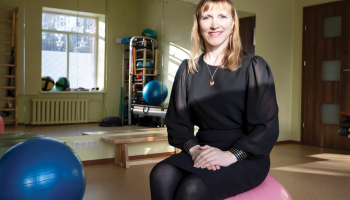Žurnāls Ir | Svarīgākais politikā, ekonomikā un kultūrā
Jaunākie raksti

Kā mākslīgais intelekts maina studentu un pasniedzēju dzīvi?
Kā mākslīgais intelekts maina studentu un pasniedzēju dzīvi, rāda Latvijas Universitātes pētījums, ko vada asociētais profesors Visvaldis Valtenbergs


Naftas cenas aug
Prokuratūra prasīs apturēt S! darbību
Latvijā dzīvojošs vēsturnieks vada Kremļa finansētu pētījumu
Lasīt vairāk →Īsi par svarīgāko ik rītu — pieraksties jaunumu vēstulei Ir Svarīgākais!

Viena diena parastas Kijivas ģimenes dzīvē
Irina Kučerenko (44) ar abiem bērniem atsakās pamest Ukrainas galvaspilsētu, kaut arī okupantu triecieni šoziem iznīcinājuši ne tikai galvenās elektrostacijas, bet dronu lādiņi jau nogalinājuši viņu kaimiņus

VIDEO: Vai Nākotnes gaisa kaujas sistēmu vēl var izglābt?
Francijas un Vācijas domstarpības apdraud Eiropas ambiciozāko aizsardzības projektu.

Patīkamas rūpes par sevi
No ikdienišķas draudzeņu sarunas līdz vienam no nozares vadošajiem uzņēmumiem — Taka spa 20 gadu jubileju sagaidījis ar miljona eiro apgrozījumu
Raidieraksti
Karikatūra
Personības
Viedokļi
Satura mārketings

Carillon Aparthotel – jauns komforta un pilsētas ritma satikšanās punkts Vecrīgā
Vecrīgā durvis ir vērusi Carillon Aparthotel – jauna apartamentu viesnīca, kas piedāvā pārdomātu un ērtu uzturēšanos pašā Rīgas vēsturiskajā centrā. Tās atrašanās vieta netālu no Rīgas Doma baznīcas ļauj viesiem būt notikumu epicentrā, vienlaikus saglabājot mierīgu un privātu vidi, kur atpūsties pēc pilsētas iepazīšanas.Carillon Aparthotel piedāvā 6

ABB eksperts: savlaicīga apkope ir kritiska, lai novērstu dārgas elektroiekārtu dīkstāves
Igaunijas Harju apriņķī izvietotais ABB elektromotoru un ģenerātoru servisa centrs ir lielākais Baltijā un viens no visaugstāk novērtētajiem apkopes pakalpojumu sniedzējiem Ziemeļeiropā. ABB elektriskās piedziņas biznesa vadītājs Latvijā Jānis Senkāns skaidro, ar kādiem defektiem servisa speciālisti saskaras visbiežāk un kāpēc uzņēmumos ir svarīgi veikt savlaicīgu tehnikas apkopi.

Biežākās problēmas ar lietotām Audi automašīnām un pieprasītākās rezerves daļas Latvijā
Audi Latvijā jau gadiem ir viens no populārākajiem premium zīmoliem lietoto auto segmentā. A4 un A6 modeļi, kā arī Q sērijas krosoveri piedāvā labu aprīkojumu, komfortu un stabilu vadāmību par konkurētspējīgu cenu. Tomēr līdz ar moderniem TFSI un TDI dzinējiem, turbokompresoriem, tiešās iesmidzināšanas sistēmām un automātiskajām pārnesumkārbām pieaug arī uzturēšanas prasības. Ar nobraukumu noteikti mezgli sāk prasīt papildu uzmanību, un tieši šīs vietas visbiežāk nosaka kopējās ekspluatācijas izmaksas.Kāpēc Audi uzturēšana ar gad
Bizness un ekonomika

Ābolu gūstītāji – Zilver veiksmes stāsts
Jānis Zilvers ar augļkopību Siguldas pusē sāka nodarboties jau pirms neatkarības, bet dēls Reinis, izstudējis filozofiju, atgriezās ģimenes saimniecībā, lai pievērstos eksotisku vīnu darīšanas mākslai. Biznesā jāsadarbojas ar konkurentiem, viņi apgalvo

Tehnoloģijas stāstu stāstīšanai
Uzņēmums Solavi nodarbojas ar mūsdienīgu audiovizuālu tehnoloģiju uzstādīšanu, producē ekspozīciju iekārtošanu muzejos un tagad radījis savu multimediju šovu Interlude

Kā pieradināt Excel
Darbs ar nebeidzamām skaitļu tabulām rada galvassāpes? Ir risinājums — Latvijā radīta platforma, ko izmēģinājuši jau 300 000 lietotāju no visas pasaules
Pētījumi
Eiropā
Recenzijas

Paralēlas pilsētas, paralēli stāsti
Jaunajā romānā Murakami atgriežas pie sena stāsta, parādot tā noslēpumaino pilsētu no jauna skatpunkta



Dzejnieks Veidenbaums. Otrais stāsts
Romāns Kārļa grāmata — aiz katras izcilas personības stāv ģimene
Ir Nauda

Domuzīme

Populārākie raksti

Dzīvās lelles. Kā modeles no Rīgas tirgoja miljonāriem
Bijušās modeļu aģentūras Vacatio modeles atklāj, kā ar aģentūras starpniecību saņēmušas miljonāru piedāvājumus

Pārdzimis Mārtiņš Freimanis? Saruna ar jauno aktieri Valtu Skuju
Šonedēļ Liepājas teātris skatītāju vērtējumam nodod izrādi par mūziķi Mārtiņu Freimani. Galveno varoni atveido jaunais aktieris Valts Skuja, kuram šī ir pirmā lielā loma

Kā Latvija iepinās skandalozajā filmā «Kremļa burvis»
Šonedēļ Latvijas kinoteātru repertuārā nonāk Rīgā filmētais Kremļa burvis. Šis ļoti dārgais projekts saskārās ar neparedzētiem finansiāliem šķēršļiem un kritiku par to, ka krievu tēli filmā attēloti pārāk pozitīvi

Epstīns un Rīgas «satriecošās meitenes»
Meitenes, paciņas un nauda uz Pļavniekiem. Ko par Rīgu var uzzināt Epstīna failos?

Trampampiņš pret Daili
Šlesera prasība aizliegt teātra izrādi ir pretrunā ar Satversmi


Nav neuzvaramu situāciju! Dziedātāja Atvara
Eirovīzijas dziesmu konkursa kvēlākie fani ārvalstīs par lielajai skatuvei vispiemērotāko dziesmu no Latvijas šogad uzskata Atvaras balādi Ēnā. Viņai gan šajā nedēļas nogalē vēl jāpārvar nacionālās atlases pusfināls

- Komentārs
- 29.01.2026.
- Aivars Ozoliņš
Trampampiņš pret Daili

- Komentārs
- 05.02.2026.
- Aivars Ozoliņš
Atkāpšanās Ogrē






![Ledus [ice]. Māris Bišofs](https://media.ir.lv/media/cache/caricature_index__2xl__jpeg/uploads/media/image/2026021512144569919c9568804.png.jpeg)
































